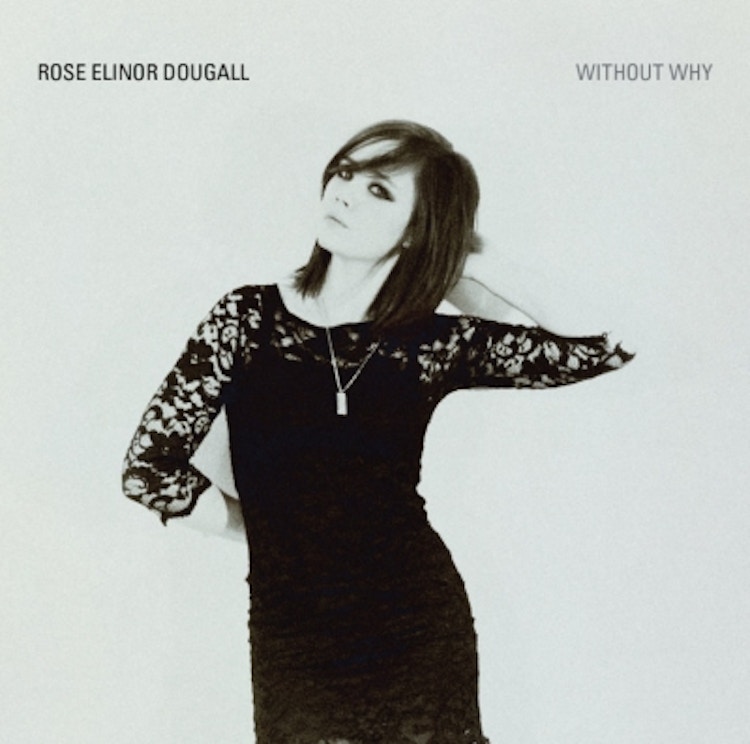"Without Why"

Rose Elinor Dougall used to be Rosay Pipette. Tempting as it is to completely ignore all that in reviewing her solo full-length bow, the baggage suggested should be considered in terms of how difficult it can be to escape your musical past. While by no means a complete creative dead end, the Pipettes came with layers of deliberate stylistic contrivance – no band accidentally ends up wearing matching polka dot dresses doing synchronised dance movements, presented as they were as one man’s svengali plaything with no shame. But as anyone these days coming across former members of the Darkness and Towers Of London, stuck in hair metal/shock-punk limbo under different guises, will attest associations can be hard to shake off.
There again, if you can attribute your past to a pseudonymic role it’s easier to work out your true self. Without Why, a title derived from a poem by a 16th century mystic, allows Dougall to forget having to issue a cheeky grin mid-pirouette and carve a new musical identity deliberately based on everything but what she used to take after. Her full vocal range, for glaring instance, is something we’ve never really heard before because it’s mostly been holding down three part harmonies. Quantifying what it recalls is tricky to exactly pin down – Siouxsie Sioux without the menace? Sophie Ellis-Bextor with emotion? It’s not too far from cult late 60s English folk singer and acknowledged influence Bridget St John. Whatever, it’s a rich, adaptable tone, capable of switching from vulnerable and lachrymose to defiantly unbowed.
It’s something that suits the newly deshackled Rose, where intelligent pop reference points you don’t hear that often nowadays – the Sundays, Lush, Felt – rub up against a set of introspective character portraits somewhere between pensive and defeated, exposing a good deal of pervasive self-doubt and deep lack of assertiveness in her lyrics. “I don’t think I am any of the things you say I am” offers ‘Find Me Out’; “please don’t ask what’s happening without you” avers ‘Carry On’, that seemingly referring to an ongoing relationship. The pointedly titled ‘Another Version Of Pop Song’ may centre on the straightforward “I want you in my life”, but while it has the rhythmic handclaps and four to the floor drumbeat it still offers a toy effect keyboard mini-solo where the chorus should be and, more tellingly, the caveat “please don’t say that it’s forever or that we belong together”. Actually, the real alternate version of a pop song is last year’s ground clearing single ‘Start/Stop/Synchro’, built around a pretty circular baroque-esque keyboard line decorated with glissandos before breaking into an insistent rhythm, around which Dougall charts love as it progresses from hopeful present to melancholic past tense, concluding with the soft admittance/denial “I know I’ll never be her”. ‘Come Away With Me’ and ‘To The Sea’, both decorated with Johnny Marr cascading guitars, yearn to take someone’s hand and escape from what life is currently throwing at her, while never quite escaping the idea that the desire to be in love is half the trouble (“gentle affections will be the death of you… no more fighting with yourself, the war is won”).
While there are moments when the guitars gets to let loose on the pedals with resultant shoegazing echoes, Without Why marks itself out more successfully as worth of critical assertion beyond the knee-jerk of someone changing their style with little regard to sales (Dougall is putting the album out herself) when it takes on cinematic hues edging towards a film noir uncomfortableness. It’s there in the affecting torch song ‘Find Me Out’, almost trip hop but with hints of Cocteau Twins in its balladic pacing, throughout which odd little bits of instrumentation – woodwind, cornet, double bass, warped sounding orchestral score – dip in and out alongside jazzy brushed drums as Dougall plaintively refers to “my cerebral faculties corroding” before the whole thing has the temerity to fade just as it sounds like the orchestra is about to hit their stride. The quietly yet deliberately sinister ‘Watching’ heavily hints at Broadcast with its analogue keyboards and gothic night in the woods shuddering menace heightened by woody percussion and subtle violin stabs, while the piano and strings-led ‘Goodnight’ turns to 3am reflectiveness. From a link on Rose’s Myspace you can freely download among other studio offcuts a charging full band version of ‘Third Attempt’. Don’t, because only the album version’s acoustic guitar picking, blurry organ and wistful vocal does it justice. “No-one can shine so brightly… but when we did, my darling, you know the world was yours and mine” Dougall ruefully dwells before hitting on the crux of her own uncertainties: “I wonder if you feel that the wool was pulled over your eyes/Was this person not the answer, really a question in disguise?”
“What will we make of these days of ours?” rhetorically asks the galloping widescreen closer ‘May Holiday’. Let’s turn the question back on she who asked it. Dougall has to an extent done her growing up in public, becoming a (self-)manufactured pop singer at 17 and leaving with some evident disenchantment at 22. At one reading Without Why is her attempt to make sense of the solitary world around her, getting to grips with young adulthood’s new emotional charges and choosing to be careful about the future for the first time. There’s traces throughout of bitter guilt and lacerating lack of self-confidence without lapsing into all-out dug in nails self-pity. It’s more a yearning thoughtfulness, the yin of getting up, accepting and getting on with it against the yang of what has passed in some lost disarray. The production is sympathetic to the cause, fluttering and subtle where needs be, strident elsewhere without losing sight of the art of pop construction or held back melodrama at its core. As an statement in locking the backstory away and making your own voice heard with all its perceived character flaws and underlying hope and regret, consider it a brave success.
Get the Best Fit take on the week in music direct to your inbox every Friday

Prima Queen
The Prize

Femi Kuti
Journey Through Life

Sunflower Bean
Mortal Primetime






